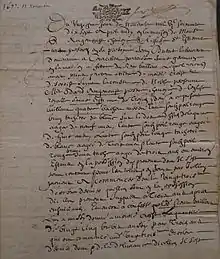
Stamp on paper : Papier timbre
In ancien regime France, papier timbré (French pronunciation: [papje tɛ̃bʁe], stamped paper) was paper with a special revenue stamp that was compulsory for all authentic acts (i.e., documents used in law, such as wills, sale contracts and vital records).[1] The tax on it, known as the timbre fiscal fixe or entier fiscal (sometimes also known as the papier timbré tax as a metonym), was one of the two forms of the timbre fiscal (the other was the timbre fiscal mobile).
The Revolt of the papier timbré in 17th century Brittany arose from resistance to the papier timbré tax.
See also
References
- ↑ Devaux, Alexandre (1911). Papiers et parchemins timbrés de France.
This article is issued from Wikipedia. The text is licensed under Creative Commons - Attribution - Sharealike. Additional terms may apply for the media files.